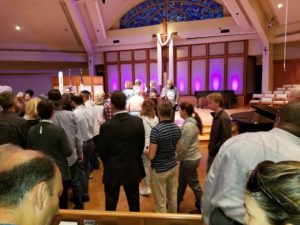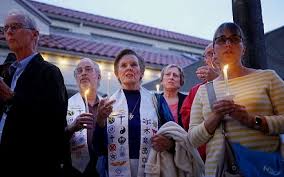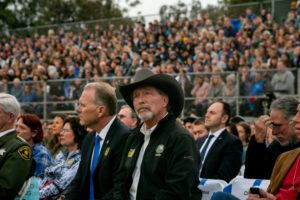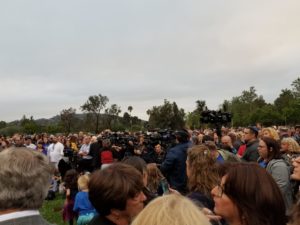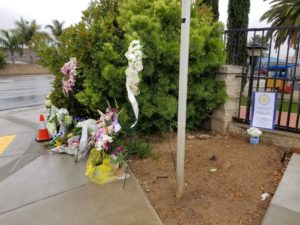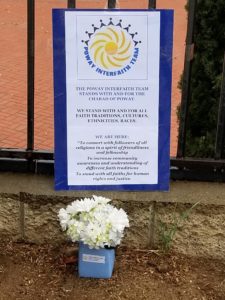COMING TOGETHER IN TIMES OF CRISIS
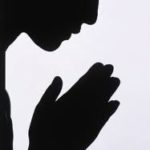
Prayer for a Pandemic
May we who are merely inconvenienced
Remember those whose lives are at stake.
May we who have no risk factors
Remember those most vulnerable.
May we who have the luxury of working from home
Remember those who must choose between preserving their health
or making their rent.
May we who have the flexibility to care for our children when their schools close
Remember those who have no options.
May we who have to cancel our trips
Remember those that have no safe* place to go.
May we who are losing our margin money in the tumult of the economic market
Remember those who have no margin at all.
May we who settle in for a quarantine at home
Remember those who have no home.
As fear grips our country,
Let us choose love.*
During this time when we cannot physically wrap our arms around each other,
Let us yet find ways to be the loving embrace of God to our neighbors.
Amen.
***
AFTER THE SHOOTING ATTACK on the CHABAD in POWAY, CA
The POINT Interfaith Team and the Poway Branch Library co-sponsored
this event with 6 speakers.

The main threads that wove through each presenter’s talk were:
Human life is sacred. We are ONE family.
Any crisis or tragedy that happens to one faith community is felt and affects All faith communities. We are ONE.
Before a Crisis:
Teach your children spiritual values and to respect all life.
Love yourself so you can love others.
Have a spiritual practice.
Don’t wait until tragedy occurs, go out and build strong and healthy relationships with people from other faiths. When tragedy occurs, we can stand with each other and support one another.
Educate the public about the various religions to bring down the fear and misconceptions they may have.
After a Crisis
Gather your community to pray/ meditate then take action.
Call and Ask , “How can I help you? What would you like me to do?”
Connect heart to heart.
Go beyond “dialogue” and BE OUT THERE getting the message out that each faith is sacred and have the same core values.
Photos
L-R
Sozui Sensei, Buddhist
Lakshmi Sukumar, Hindu
Gagandeep Kaur, Sikh
Rev. Cheri Metier, MC and President of POINT
Imam Taha Hassane, Islam
Rabbi Gabi Arad, Judaism
Dr. Jim Davies, The Church of Jesus Christ of Latter-day Saints
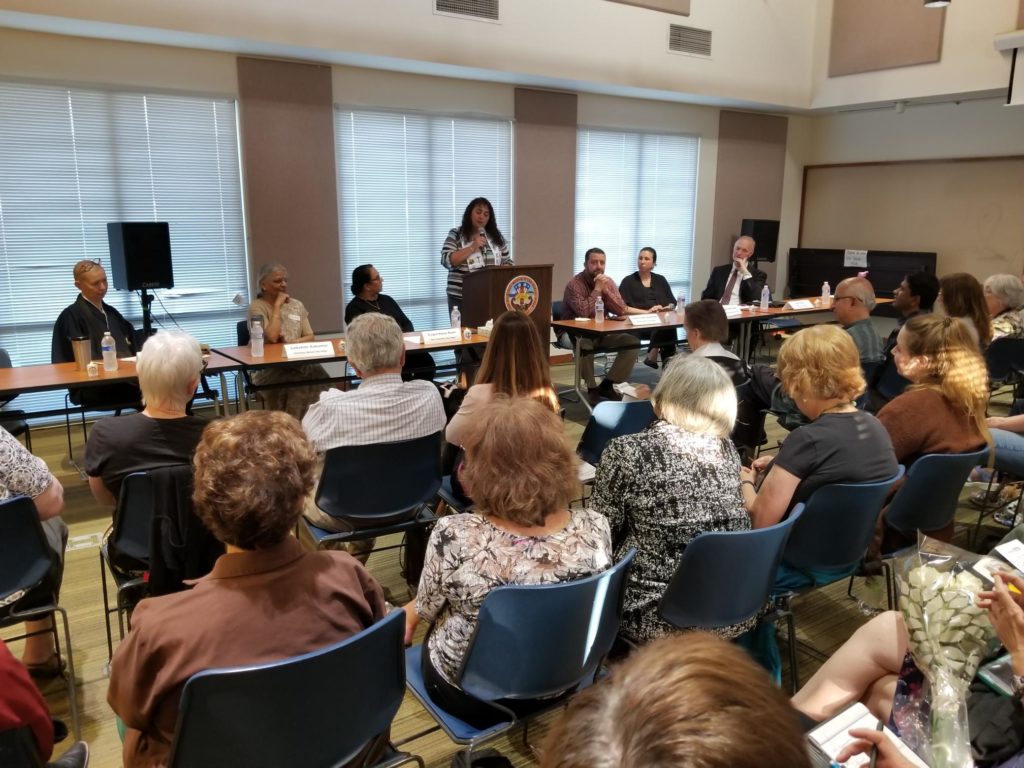
***
SOLIDARITY IN TIMES OF CRISIS

Interfaith Solidarity in Response to the Attack on Chabad of Poway
By Susan L. Lipson
April 29, 2019
Since the shooting at Chabad of Poway (the Orthodox congregation in Poway, California), on April 27, people of all faiths, from Poway and throughout San Diego County, have rallied together for candlelight vigils and prayer services in support of their Jewish neighbors—“neighbors” being the operative word. Over 4000 people showed up on April 29 at Poway High School for a community vigil against hate, cosponsored by the Anti-Defamation League and Poway Unified School District. The most powerful answer to those who divide people into “Us versus Them” or “Right versus Wrong” or “Supreme versus Inferior” is interfaith solidarity.
The mission statement of the Poway Interfaith Team reads: “We believe diverse faith traditions in our communities add to the richness of life. When we meet and learn more about those who have faith traditions other than our own, we find many more similarities than differences. For example, every faith tradition’s holy books teach something similar to ‘love your neighbor as yourself.’ We support a culture of interfaith dialogue and inter-religious cooperation as a way of life in all communities throughout the San Diego region.” As a Poway Interfaith Team board member, representing Temple Adat Shalom, I define “interfaith solidarity” as follows:
Interfaith solidarity means to stand for peaceful coexistence and mutual understanding among neighbors. Our bonds with our neighbors must be based on what all people value, LOVE, rather than on conflicts, as alliances forged from shared anger or resistance toward some mutual enemy or ideology. Interfaith solidarity means a showing of respect for all faiths, or, at the very least, a tolerance of others’ beliefs–the antithesis of “supremacy.” Too many religions inherently contribute to the notion of “supremacy” by implying that our religions have the “right” path to God. A banner at a local Unity church in San Diego caught my eye and my heart with this phrase: “One God, many paths.” THAT sums up “Interfaith solidarity.”
Solidarity was expressed in San Diego beginning last Saturday night, at the Rancho Bernardo Presbyterian Church, just a block from Chabad of Poway. Hundreds of people of all faiths assembled, after only a few hours’ notice following the shooting, to pray together for peace, healing, and love. The service, co-led by local Christian (Presbyterian and Episcopal) and Jewish (Reform) spiritual leaders was interactive and spiritual. Congregants were asked to move through the pews and introduce themselves to strangers, shaking hands and saying, “Peace be with you,” while looking into a stranger-friend’s eyes. During the prayer time, Reverend Mark McKone-Sweet, of nearby St. Bartholomew’s Episcopal Church, directed us to close our eyes and pray in silence for ten minutes. What a strange feeling of luxury for me, as a Jew, that night: to relax into prayer, without stiffening and opening my eyes at the mere sound of a shutting door or someone accidentally dropping something on the floor. American Jews no longer have the luxury of resting with closed eyes amid a congregation of fellow Jews. When Cantor Lori Wilinsky-Frank, of Temple Adat Shalom of Poway, led the crowd in singing “Oseh Shalom,” a song asking God to grant us peace, hundreds of voices sang the word “shalom” together, and a healing energy swept through the sanctuary. And when congregants carried lit candles from the sanctuary into the courtyard, for a circular gathering that enabled us to see the faces of true neighbors, rather than the backs and profiles viewed from the pews, the warmth from more than candles embraced the crowd.
Two days later, at the vigil at Poway High School, thousands of people gave standing ovations to various speakers ranging from Jewish community leaders to first responders to government officials to diverse religious leaders, all broadcasting uplifting (even in sobering), messages of support, peace, and love to the Poway community. Participants swayed, arm in arm, atop the bleachers and in the seats on the football field while singing “This Land is Your Land, This Land is My Land.” Hope for better tomorrows was felt in the announcement that this week in the local schools is the official #NoPlaceforHate week.
Interfaith relationships have the potential to erase the wariness of “Others” that is empowered by fear-mongers, who build walls instead of bridges between the diverse groups in our communities. Interfaith cooperation is essentially bridge-building. We need this cooperation now more than ever.
Our Poway Interfaith Team was called only weeks ago to support one of our Muslim member communities in Escondido after their mosque was set ablaze (allegedly by the same man who shot the Chabad worshippers). Vigils and volunteer interfaith security teams quickly formed to enable our Muslim neighbors to pray in peace. Likewise, our Muslim neighbors and leaders showed up six months ago for multiple vigils in San Diego in memory of the Pittsburgh synagogue shooting victims. This past weekend, I heard talk among the Interfaith community about beefing up vigilance for the Latino churches in our neighborhoods, because immigrants, Muslims, and Jews are all targets of white supremacists in our particular area of California. Christians in the USA are not immune to hate crimes, either, as evidenced by the recent brutal attacks on African-American Christian churches, based not necessarily on the worshippers’ religion, but more so on their skin color. Despite the white supremacists’ false claims of upholding Christian values, the majority of peaceful, loving, American Christians do not recognize them as people of faith, just as the majority of peaceful, loving, American Muslims do not recognize the haters who have polluted their faith by claiming it as justification for murder.
Interfaith leaders strive to avoid polluting our programs and cooperative efforts with politics. It is sometimes hard to separate the ideals and beliefs about respectful coexistence from national and international issues. But the goal of our Interfaith community is not to make people accept our beliefs—only to accept our right to have beliefs that differ from theirs, while we all strive to coexist peacefully. The enemy of peace seems to be the very notion of supremacy: the assumption that any human being is worth more than another.
Susan L. Lipson
Author, Editor, & Writing Teacher
“A memorable novel is a gift of vicarious experiences, from author to reader.” (S. L. Lipson)
www.susanllipsonauthor.com
www.susanllipson.blogspot.com
www.susanllipsonwritingteacher.blogspot.com
Photos of Prayer Vigils
